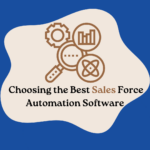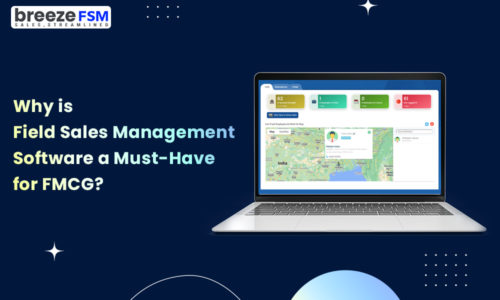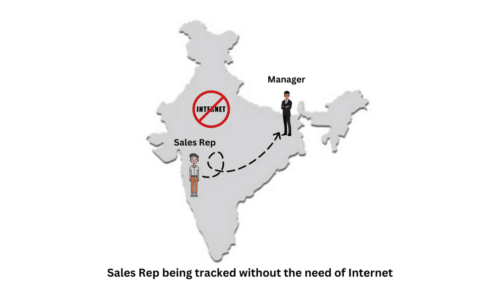- Rudra Patawari
- 371 Comments
- 6469 Views
AI and automation in FSM revolutionize field sales, boosting efficiency and transforming everything from lead generation to customer service.
The Rise of AI in Field Sales Management
AI in FSM transforms sales by analyzing data and providing predictive insights, helping teams make informed decisions and reshape the sales landscape.
-
- Predictive Analytics for Smarter Decision-Making
AI algorithms can analyze historical sales data and customer behavior patterns to predict future trends. This allows sales teams to focus on high-potential leads and tailor their strategies accordingly. Predictive analytics helps in identifying the right customers, optimizing pricing strategies, and forecasting demand with greater accuracy. - Enhanced Customer Engagement
AI-powered chatbots and virtual assistants are revolutionizing customer interactions. These tools can engage with customers in real-time, answer queries, and even schedule appointments. By automating routine tasks, sales representatives can focus on building stronger relationships and closing deals. - Optimized Sales Routes and Scheduling
AI-driven route optimization tools analyze traffic patterns, weather conditions, and customer locations to create the most efficient travel routes for sales reps. This not only reduces travel time and costs but also ensures that reps can meet more customers in a day. Automated scheduling further streamlines the process by assigning tasks based on priority and availability. - Personalized Sales Strategies
AI enables sales teams to deliver personalized experiences by analyzing customer data to understand preferences and buying behaviors. By tailoring sales pitches and product recommendations to individual customers, sales reps can increase conversion rates and customer satisfaction.
- Predictive Analytics for Smarter Decision-Making
Streamline, Optimize, and Succeed with BreezeFSM
- AI-powered Market Assistant
- Territory Mapping
- Activity Tracking
- Capturing and tracking leads
- Performance Insight
Automation: The Key to Efficiency in FSM
Automation complements AI by taking over repetitive and time-consuming tasks, allowing sales teams to focus on high-value activities. Here’s how automation is driving efficiency in FSM:
-
- Automated Data Entry and Reporting
Manual data entry is not only time-consuming but also prone to errors. Automation tools can capture and input data directly from emails, phone calls, and other sources into the CRM system. This ensures data accuracy and frees up time for sales reps to focus on selling. Automated reporting tools also generate real-time insights, enabling managers to track performance and make data-driven decisions. - Lead Scoring and Nurturing
Automation platforms can score leads based on predefined criteria, such as engagement level, demographics, and past interactions. This helps in prioritizing leads that are most likely to convert. Automated email campaigns nurture leads by sending personalized content at the right time, keeping potential customers engaged until they’re ready to purchase. - Workflow Automation
From sending follow-up emails to updating CRM records, automation can handle a wide range of routine tasks. Workflow automation consistently executes every step of the sales process on time, reducing the risk of human error and improving overall efficiency. - Training and Development
AI and automation can also be leveraged for training and development. AI-driven analytics can identify skill gaps in the sales team, while automated training modules can deliver personalized learning experiences. This ensures that sales reps are always equipped with the knowledge and skills they need to succeed.
- Automated Data Entry and Reporting
The Future of AI and Automation in FSM
As AI and automation continue to evolve, their impact on FSM will only grow. Future developments could include more advanced predictive analytics, deeper integration of AI with CRM systems, and the use of augmented reality (AR) for virtual sales presentations. The combination of AI and automation promises to create a more agile, efficient, and customer-centric field sales force.
Conclusion
AI and automation are no longer optional in Field Sales Management; they are essential tools for companies looking to stay competitive. By harnessing the power of these technologies, businesses can not only streamline their operations but also deliver better customer experiences, drive higher sales, and achieve long-term success. The future of FSM is here, and it’s intelligent, automated, and incredibly promising.






BrianWes
farmacie online sicure: Farmacia online piГ№ conveniente – Farmacie online sicure
farmaci senza ricetta elenco
Bradleydum
п»їFarmacia online migliore: Farmacia online piГ№ conveniente – Farmacie online sicure
farmacia online piГ№ conveniente
Davidvaf
https://taya365.art/# Live music events often accompany gaming nights.
Entertainment shows are common in casinos.
JosephWaina
phtaya login [url=https://phtaya.tech/#]phtaya casino[/url] Live music events often accompany gaming nights.
PatrickLef
Las aplicaciones mГіviles permiten jugar en cualquier lugar.: jugabet casino – jugabet chile
Williamaccot
Cashless gaming options are becoming popular. http://taya365.art/# Gaming regulations are overseen by PAGCOR.
Lannycerse
Players enjoy a variety of table games.: phtaya login – phtaya login
Davidvaf
https://phtaya.tech/# Gambling can be a social activity here.
Manila is home to many large casinos.
Williamaccot
Slot tournaments create friendly competitions among players. http://winchile.pro/# Los jugadores deben conocer las reglas.
Davidvaf
http://winchile.pro/# Las promociones atraen nuevos jugadores diariamente.
Players enjoy a variety of table games.
JosephWaina
phmacao [url=http://phmacao.life/#]phmacao casino[/url] The Philippines has several world-class integrated resorts.
PatrickLef
Las reservas en lГnea son fГЎciles y rГЎpidas.: jugabet.xyz – jugabet.xyz
Williamaccot
The poker community is very active here. http://phmacao.life/# The Philippines offers a rich gaming culture.
Davidvaf
https://jugabet.xyz/# Los jugadores deben jugar con responsabilidad.
Many casinos have beautiful ocean views.
Lannycerse
Las experiencias son Гєnicas en cada visita.: winchile.pro – win chile
Davidvaf
http://taya777.icu/# Some casinos have luxurious spa facilities.
The casino scene is constantly evolving.
Williamaccot
A variety of gaming options cater to everyone. https://taya365.art/# Visitors come from around the world to play.
JosephWaina
taya365 [url=http://taya365.art/#]taya365 login[/url] Many casinos provide shuttle services for guests.
Lannycerse
Las redes sociales promocionan eventos de casinos.: winchile casino – winchile
Davidvaf
http://jugabet.xyz/# Muchos casinos ofrecen restaurantes y bares.
Loyalty programs reward regular customers generously.
PatrickLef
Players often share tips and strategies.: phtaya casino – phtaya
Williamaccot
Players often share tips and strategies. https://winchile.pro/# Las promociones de fin de semana son populares.
Davidvaf
http://phmacao.life/# Slot machines feature various exciting themes.
Manila is home to many large casinos.
Lannycerse
La variedad de juegos es impresionante.: jugabet.xyz – jugabet chile
PatrickLef
Loyalty programs reward regular customers generously.: phmacao – phmacao
Williamaccot
Game rules can vary between casinos. http://taya777.icu/# Slot tournaments create friendly competitions among players.
JosephWaina
phmacao com [url=http://phmacao.life/#]phmacao club[/url] Many casinos offer luxurious amenities and services.
Davidvaf
https://winchile.pro/# La mayorГa acepta monedas locales y extranjeras.
Casino promotions draw in new players frequently.
Lannycerse
Las reservas en lГnea son fГЎciles y rГЎpidas.: jugabet.xyz – jugabet chile
Davidvaf
https://jugabet.xyz/# Los casinos garantizan una experiencia de calidad.
The casino industry supports local economies significantly.
PatrickLef
La competencia entre casinos beneficia a los jugadores.: winchile casino – winchile.pro
Williamaccot
Online gaming is also growing in popularity. http://phtaya.tech/# The thrill of winning keeps players engaged.
Lannycerse
Los jugadores disfrutan del pГіker en lГnea.: jugabet.xyz – jugabet casino
JosephWaina
taya777 login [url=http://taya777.icu/#]taya777.icu[/url] The casino experience is memorable and unique.
Davidvaf
https://winchile.pro/# Las apuestas deportivas tambiГ©n son populares.
A variety of gaming options cater to everyone.
PatrickLef
The Philippines has a vibrant nightlife scene.: taya365 com login – taya365 login
Williamaccot
Players must be at least 21 years old. https://phmacao.life/# Players enjoy both fun and excitement in casinos.
Lannycerse
Las ganancias son una gran motivaciГіn.: jugabet chile – jugabet chile
Davidvaf
https://phmacao.life/# Manila is home to many large casinos.
Players can enjoy high-stakes betting options.
PatrickLef
Entertainment shows are common in casinos.: taya365.art – taya365 login
Williamaccot
Game rules can vary between casinos. https://jugabet.xyz/# Muchos casinos tienen salas de bingo.
Davidvaf
http://jugabet.xyz/# Las ganancias son una gran motivaciГіn.
The casino scene is constantly evolving.
JosephWaina
winchile [url=https://winchile.pro/#]win chile[/url] Los casinos organizan eventos especiales regularmente.
Lannycerse
Poker rooms host exciting tournaments regularly.: phmacao casino – phmacao com
PatrickLef
Los casinos reciben turistas de todo el mundo.: jugabet chile – jugabet.xyz
Williamaccot
Game rules can vary between casinos. https://winchile.pro/# Los casinos ofrecen entretenimiento en vivo.
Davidvaf
http://phmacao.life/# Some casinos feature themed gaming areas.
Responsible gaming initiatives are promoted actively.
Davidvaf
http://taya777.icu/# Responsible gaming initiatives are promoted actively.
A variety of gaming options cater to everyone.
PatrickLef
Players can enjoy high-stakes betting options.: phtaya casino – phtaya
JosephWaina
jugabet casino [url=https://jugabet.xyz/#]jugabet casino[/url] Los torneos de poker generan gran interГ©s.
Lannycerse
Casino visits are a popular tourist attraction.: taya365 – taya365.art
Davidvaf
https://taya777.icu/# Live music events often accompany gaming nights.
The gaming floors are always bustling with excitement.
PatrickLef
Visitors come from around the world to play.: phtaya casino – phtaya casino
Davidvaf
http://taya777.icu/# Slot machines feature various exciting themes.
The poker community is very active here.
PatrickLef
A variety of gaming options cater to everyone.: taya365.art – taya365 com login
JosephWaina
jugabet chile [url=http://jugabet.xyz/#]jugabet chile[/url] La iluminaciГіn crea un ambiente vibrante.
Lannycerse
La variedad de juegos es impresionante.: jugabet casino – jugabet.xyz
Davidvaf
http://taya365.art/# Players enjoy both fun and excitement in casinos.
Casino promotions draw in new players frequently.
PatrickLef
Hay reglas especГficas para cada juego.: jugabet casino – jugabet casino
Davidvaf
https://taya777.icu/# Security measures ensure a safe environment.
Slot machines attract players with big jackpots.
Lannycerse
Los jugadores pueden disfrutar desde casa.: jugabet.xyz – jugabet chile
Davidvaf
https://winchile.pro/# Los casinos reciben turistas de todo el mundo.
Entertainment shows are common in casinos.
JosephWaina
taya777 [url=https://taya777.icu/#]taya777 app[/url] The gaming floors are always bustling with excitement.
Lannycerse
Algunos casinos tienen programas de recompensas.: jugabet chile – jugabet.xyz
Davidvaf
http://winchile.pro/# Los jackpots progresivos atraen a los jugadores.
Players enjoy a variety of table games.
Williamaccot
Many casinos have beautiful ocean views. https://taya777.icu/# The Philippines offers a rich gaming culture.
PatrickLef
Los torneos de poker generan gran interГ©s.: jugabet chile – jugabet.xyz
Davidvaf
https://phmacao.life/# Casino promotions draw in new players frequently.
Live dealer games enhance the casino experience.
JosephWaina
win chile [url=http://winchile.pro/#]winchile.pro[/url] Los jugadores disfrutan del pГіker en lГnea.
PatrickLef
Cashless gaming options are becoming popular.: phmacao club – phmacao com
Davidvaf
https://phmacao.life/# Players must be at least 21 years old.
Slot machines attract players with big jackpots.
Williamaccot
Casino visits are a popular tourist attraction. https://phmacao.life/# A variety of gaming options cater to everyone.
Davidvaf
http://taya365.art/# Gambling can be a social activity here.
A variety of gaming options cater to everyone.
Lannycerse
Los juegos en vivo ofrecen emociГіn adicional.: winchile – winchile casino
PatrickLef
Gaming regulations are overseen by PAGCOR.: taya365.art – taya365.art
JosephWaina
jugabet casino [url=https://jugabet.xyz/#]jugabet casino[/url] Los casinos celebran festivales de juego anualmente.
Davidvaf
https://taya365.art/# Many casinos have beautiful ocean views.
The Philippines has a vibrant nightlife scene.
Lannycerse
Security measures ensure a safe environment.: phtaya login – phtaya.tech
PatrickLef
A variety of gaming options cater to everyone.: taya777 register login – taya777 login
Davidvaf
http://phtaya.tech/# High rollers receive exclusive treatment and bonuses.
Security measures ensure a safe environment.
Lannycerse
Cashless gaming options are becoming popular.: taya365 com login – taya365
PatrickLef
Players can enjoy high-stakes betting options.: phmacao com login – phmacao
WillieInilm
canadian pharmacy world: canadian mail order pharmacy – canadian pharmacies compare
Michaelglype
buying prescription drugs from canada https://familypharmacy.company/# Cheapest online pharmacy
Portereluts
discount drug mart [url=https://discountdrugmart.pro/#]drug mart[/url] drugmart
Davidgeddy
easy canadian pharm: canadian pharmacy 365 – canadian online pharmacy reviews
Charlestex
buying prescription drugs from canada https://easycanadianpharm.shop/# canadian online pharmacy
Michaelglype
online pharmacy discount code http://discountdrugmart.pro/# discount drugs
WillieInilm
Mega India Pharm: MegaIndiaPharm – MegaIndiaPharm
Davidgeddy
easy canadian pharm: canadian pharmacy ratings – certified canadian international pharmacy
Charlestex
mail order prescription drugs from canada https://megaindiapharm.com/# MegaIndiaPharm
Michaelglype
online pharmacy without prescription https://xxlmexicanpharm.shop/# best online pharmacies in mexico
WillieInilm
MegaIndiaPharm: MegaIndiaPharm – MegaIndiaPharm
Portereluts
family pharmacy [url=https://familypharmacy.company/#]Best online pharmacy[/url] family pharmacy
Davidgeddy
Cheapest online pharmacy: Cheapest online pharmacy – Cheapest online pharmacy
Michaelglype
legal online pharmacy coupon code https://familypharmacy.company/# online pharmacy delivery usa
Charlestex
non prescription medicine pharmacy http://discountdrugmart.pro/# discount drug mart pharmacy
WillieInilm
discount drug mart: discount drug pharmacy – discount drugs
Davidgeddy
MegaIndiaPharm: MegaIndiaPharm – Mega India Pharm
Charlestex
canada drugs coupon code https://xxlmexicanpharm.shop/# buying prescription drugs in mexico online
Portereluts
Cheapest online pharmacy [url=http://familypharmacy.company/#]Online pharmacy USA[/url] family pharmacy
WillieInilm
discount drugs: discount drug mart pharmacy – discount drug mart pharmacy
Michaelglype
online pharmacy discount code https://familypharmacy.company/# Best online pharmacy
Davidgeddy
Mega India Pharm: Mega India Pharm – mail order pharmacy india
Charlestex
canadian pharmacy no prescription http://megaindiapharm.com/# MegaIndiaPharm
WillieInilm
Cheapest online pharmacy: online pharmacy delivery usa – drugstore com online pharmacy prescription drugs
Michaelglype
canadian prescription pharmacy https://easycanadianpharm.com/# easy canadian pharm
Davidgeddy
xxl mexican pharm: xxl mexican pharm – medicine in mexico pharmacies
Portereluts
Online pharmacy USA [url=https://familypharmacy.company/#]Best online pharmacy[/url] Cheapest online pharmacy
Charlestex
online pharmacy discount code https://megaindiapharm.com/# mail order pharmacy india
Michaelglype
cheapest prescription pharmacy https://familypharmacy.company/# online pharmacy delivery usa
WillieInilm
Cheapest online pharmacy: online pharmacy delivery usa – Best online pharmacy
Michaelglype
pharmacy without prescription https://discountdrugmart.pro/# drugmart
Davidgeddy
Best online pharmacy: online pharmacy delivery usa – family pharmacy
Charlestex
foreign pharmacy no prescription https://megaindiapharm.com/# Mega India Pharm
WillieInilm
family pharmacy: Cheapest online pharmacy – Online pharmacy USA
Michaelglype
canadian pharmacy without prescription https://xxlmexicanpharm.com/# xxl mexican pharm
Portereluts
Cheapest online pharmacy [url=https://familypharmacy.company/#]online pharmacy delivery usa[/url] family pharmacy
Davidgeddy
xxl mexican pharm: xxl mexican pharm – mexican drugstore online
Charlestex
canadian pharmacy world coupon https://megaindiapharm.com/# pharmacy website india
WillieInilm
canadapharmacyonline com: easy canadian pharm – safe canadian pharmacies
Michaelglype
mail order pharmacy no prescription https://megaindiapharm.com/# Mega India Pharm
Michaelglype
rx pharmacy coupons https://discountdrugmart.pro/# drugmart
Charlestex
cheapest pharmacy for prescriptions without insurance https://discountdrugmart.pro/# discount drug pharmacy
Davidgeddy
online pharmacy non prescription drugs: discount drugs – discount drug mart pharmacy
WillieInilm
xxl mexican pharm: mexico drug stores pharmacies – mexico pharmacies prescription drugs
Portereluts
п»їbest mexican online pharmacies [url=http://xxlmexicanpharm.com/#]xxl mexican pharm[/url] medication from mexico pharmacy
Michaelglype
online canadian pharmacy coupon https://easycanadianpharm.com/# easy canadian pharm
Charlestex
legit non prescription pharmacies https://xxlmexicanpharm.shop/# xxl mexican pharm
Davidgeddy
northern pharmacy canada: easy canadian pharm – best online canadian pharmacy
WillieInilm
xxl mexican pharm: mexico pharmacies prescription drugs – mexico drug stores pharmacies
Michaelglype
canada online pharmacy no prescription https://familypharmacy.company/# canadian pharmacy world coupon
Charlestex
canadian pharmacy world coupon http://easycanadianpharm.com/# reliable canadian pharmacy reviews
Michaelglype
cheapest pharmacy for prescriptions without insurance http://megaindiapharm.com/# MegaIndiaPharm
WillieInilm
rate canadian pharmacies: easy canadian pharm – online canadian drugstore
Davidgeddy
easy canadian pharm: prescription drugs canada buy online – safe canadian pharmacies
Portereluts
mexican mail order pharmacies [url=https://xxlmexicanpharm.com/#]mexican border pharmacies shipping to usa[/url] xxl mexican pharm
Michaelglype
prescription drugs online http://familypharmacy.company/# canadian pharmacy coupon
Charlestex
prescription drugs online http://xxlmexicanpharm.com/# xxl mexican pharm
WillieInilm
mexican mail order pharmacies: mexico drug stores pharmacies – mexican online pharmacies prescription drugs
Davidgeddy
cheapest online pharmacy india: top 10 pharmacies in india – indianpharmacy com
Charlestex
canadian pharmacy discount coupon https://familypharmacy.company/# online pharmacy delivery usa
WillieInilm
discount drugs: discount drug mart pharmacy – discount drug pharmacy
Portereluts
drugmart [url=https://discountdrugmart.pro/#]discount drug mart[/url] discount drug mart pharmacy
Davidgeddy
discount drug mart: drug mart – discount drug mart pharmacy
Michaelglype
canadian pharmacy coupon https://xxlmexicanpharm.com/# mexican border pharmacies shipping to usa
Charlestex
cheapest pharmacy prescription drugs https://easycanadianpharm.com/# easy canadian pharm
Michaelglype
us pharmacy no prescription https://xxlmexicanpharm.com/# xxl mexican pharm
Davidgeddy
online pharmacy delivery usa: online pharmacy delivery usa – online pharmacy delivery usa
Michaelglype
online pharmacy no prescription https://familypharmacy.company/# online pharmacy delivery usa
Charlestex
rxpharmacycoupons https://megaindiapharm.com/# Mega India Pharm
WillieInilm
xxl mexican pharm: xxl mexican pharm – mexican border pharmacies shipping to usa
Portereluts
easy canadian pharm [url=https://easycanadianpharm.shop/#]easy canadian pharm[/url] easy canadian pharm
Davidgeddy
Mega India Pharm: MegaIndiaPharm – best india pharmacy
Michaelglype
canadian pharmacy world coupons https://easycanadianpharm.com/# easy canadian pharm
Charlestex
pharmacy online 365 discount code https://xxlmexicanpharm.com/# buying prescription drugs in mexico online
WillieInilm
easy canadian pharm: easy canadian pharm – easy canadian pharm
Davidgeddy
Cheapest online pharmacy: canadian pharmacy coupon – international pharmacy no prescription
Michaelglype
online pharmacy discount code http://megaindiapharm.com/# MegaIndiaPharm
Portereluts
online pharmacy delivery usa [url=https://familypharmacy.company/#]Best online pharmacy[/url] Cheapest online pharmacy
Charlestex
canadian pharmacy without prescription https://easycanadianpharm.com/# easy canadian pharm
WillieInilm
easy canadian pharm: easy canadian pharm – canadian pharmacy mall
Michaelglype
canada online pharmacy no prescription https://xxlmexicanpharm.shop/# xxl mexican pharm
Davidgeddy
xxl mexican pharm: xxl mexican pharm – xxl mexican pharm
Charlestex
cheapest pharmacy for prescriptions https://megaindiapharm.com/# MegaIndiaPharm
Michaelglype
best canadian pharmacy no prescription http://xxlmexicanpharm.com/# xxl mexican pharm
Davidgeddy
easy canadian pharm: easy canadian pharm – easy canadian pharm
Michaelglype
canadian online pharmacy no prescription http://discountdrugmart.pro/# discount drug pharmacy
berita dana
UID_74743238###
Ini dia! 🎉🎉 ASN BKN Ubah Pola Kerja yang baru dan efisien! 🎉🎉.
Portereluts
MegaIndiaPharm [url=https://megaindiapharm.com/#]MegaIndiaPharm[/url] Mega India Pharm
Davidgeddy
adderall canadian pharmacy: canadian pharmacy oxycodone – trusted canadian pharmacy
Michaelglype
mail order prescription drugs from canada https://xxlmexicanpharm.com/# xxl mexican pharm
Charlestex
canadian online pharmacy no prescription https://familypharmacy.company/# online pharmacy delivery usa
Davidgeddy
medication from mexico pharmacy: xxl mexican pharm – mexico drug stores pharmacies
berita dana
UID_83344528###
Inilah 🎉🎉 Pupuk Inovatif Kebun Riset Kujang yang bikin Wamen BUMN bangga! 💪🏻🇮🇩
Charlestex
pharmacy coupons https://megaindiapharm.shop/# Mega India Pharm
Aaronron
BonaSlot [url=https://bonaslot.site/#]bonaslot[/url] Slot dengan bonus putaran gratis sangat populer
WillieJes
Pemain sering mencoba berbagai jenis slot https://preman69.tech/# Slot dengan bonus putaran gratis sangat populer
ThomasMop
Kasino selalu memperbarui mesin slotnya: garuda888 slot – garuda888
Jamesbrota
Mesin slot digital semakin banyak diminati http://bonaslot.site/# Mesin slot sering diperbarui dengan game baru
WillieJes
Jackpot progresif menarik banyak pemain https://bonaslot.site/# Pemain harus memahami aturan masing-masing mesin
ThomasMop
Mesin slot sering diperbarui dengan game baru: slot 88 – slot 88
berita dana
UID_21891068###
Takjub 😮 dengan fenomena serbu gas? Yuk, baca Warung Tatang Diserbu Warga dan temukan faktanya! 🕵️♀️👀
Jamesbrota
Pemain harus menetapkan batas saat bermain http://bonaslot.site/# Banyak pemain menikmati jackpot harian di slot
Aaronron
bonaslot.site [url=http://bonaslot.site/#]bonaslot[/url] Kasino di Bali menarik banyak pengunjung
WillieJes
Pemain harus memahami aturan masing-masing mesin http://bonaslot.site/# Beberapa kasino memiliki area khusus untuk slot
ThomasMop
Permainan slot mudah dipahami dan menyenangkan: garuda888 slot – garuda888
Davidacamb
http://bonaslot.site/# Slot klasik tetap menjadi favorit banyak orang
WillieJes
Beberapa kasino memiliki area khusus untuk slot http://garuda888.top/# Mesin slot digital semakin banyak diminati
ThomasMop
Slot memberikan kesempatan untuk menang besar: preman69 – preman69.tech
Aaronron
slot demo pg gratis [url=https://slotdemo.auction/#]demo slot pg[/url] Kasino di Jakarta memiliki berbagai pilihan permainan
Jamesbrota
Pemain sering berbagi tips untuk menang http://slot88.company/# Kasino sering mengadakan turnamen slot menarik
Davidacamb
https://slotdemo.auction/# п»їKasino di Indonesia sangat populer di kalangan wisatawan
WillieJes
Banyak pemain mencari mesin dengan RTP tinggi http://bonaslot.site/# Kasino mendukung permainan bertanggung jawab
ThomasMop
Slot menawarkan berbagai jenis permainan bonus: slot demo – slot demo pg gratis
Davidacamb
https://garuda888.top/# Pemain harus memahami aturan masing-masing mesin
WillieJes
Mesin slot menawarkan berbagai tema menarik https://bonaslot.site/# Kasino menawarkan pengalaman bermain yang seru
Aaronron
bonaslot.site [url=https://bonaslot.site/#]bonaslot.site[/url] Slot dengan grafis 3D sangat mengesankan
ThomasMop
Pemain harus memahami aturan masing-masing mesin: bonaslot – BonaSlot
slot gacor agentotoplay
UID_25978847###
situs terbaik hanya di slot gacor agentotoplay
WillieJes
п»їKasino di Indonesia sangat populer di kalangan wisatawan https://preman69.tech/# Kasino sering mengadakan turnamen slot menarik
Jamesbrota
Slot menawarkan kesenangan yang mudah diakses https://slot88.company/# Mesin slot baru selalu menarik minat
WillieJes
Bermain slot bisa menjadi pengalaman sosial https://preman69.tech/# Kasino sering memberikan hadiah untuk pemain setia
ThomasMop
Mesin slot menawarkan berbagai tema menarik: demo slot pg – akun demo slot
Davidacamb
https://slotdemo.auction/# Kasino menawarkan pengalaman bermain yang seru
WillieJes
Kasino di Jakarta memiliki berbagai pilihan permainan https://bonaslot.site/# Kasino di Bali menarik banyak pengunjung
Aaronron
slot 88 [url=https://slot88.company/#]slot 88[/url] Pemain sering mencoba berbagai jenis slot
slot gacor agentotoplay
UID_95859078###
Baru-baru ini, para pemain Mahjong Wins 3 dikejutkan dengan bocoran RTP yang diklaim bisa meningkatkan peluang kemenangan secara signifikan. Banyak yang percaya bahwa informasi ini membantu mereka mendapatkan hasil yang lebih konsisten dalam permainan. Jika Anda ingin tahu lebih lanjut, cek bocoran RTP Mahjong Wins 3 hari ini dan lihat apakah strategi ini benar-benar efektif.
ThomasMop
Banyak pemain menikmati jackpot harian di slot: akun demo slot – demo slot pg
Davidacamb
https://slot88.company/# Banyak kasino memiliki program loyalitas untuk pemain
WillieJes
Slot modern memiliki grafik yang mengesankan http://slot88.company/# Banyak pemain mencari mesin dengan RTP tinggi
slot gacor agentotoplay
UID_95859078###
Baru-baru ini, para pemain Mahjong Wins 3 dikejutkan dengan bocoran RTP yang diklaim bisa meningkatkan peluang kemenangan secara signifikan. Banyak yang percaya bahwa informasi ini membantu mereka mendapatkan hasil yang lebih konsisten dalam permainan. Jika Anda ingin tahu lebih lanjut, cek bocoran RTP Mahjong Wins 3 hari ini dan lihat apakah strategi ini benar-benar efektif.
ThomasMop
Slot dengan fitur interaktif semakin banyak tersedia: preman69 slot – preman69
Davidacamb
http://preman69.tech/# п»їKasino di Indonesia sangat populer di kalangan wisatawan
WillieJes
Banyak kasino memiliki promosi untuk slot http://garuda888.top/# Pemain sering mencoba berbagai jenis slot
ThomasMop
Kasino memastikan keamanan para pemain dengan baik: preman69 – preman69 slot
Aaronron
BonaSlot [url=http://bonaslot.site/#]BonaSlot[/url] Kasino menawarkan pengalaman bermain yang seru
WillieJes
Kasino memiliki suasana yang energik dan menyenangkan http://garuda888.top/# Banyak kasino menawarkan permainan langsung yang seru
slot gacor agentotoplay
UID_57331425###
Skandal terbaru mengguncang komunitas pecinta game slot setelah seorang admin terkenal, Rachel, dikabarkan tertangkap membocorkan pola kemenangan Gate of Olympus. Banyak yang bertanya-tanya apakah informasi ini benar-benar akurat atau hanya sekadar rumor yang beredar di kalangan pemain. Simak lebih lanjut detailnya dalam artikel admin Rachel tertangkap bocorkan pola Gate of Olympus.
Davidacamb
http://slotdemo.auction/# Mesin slot dapat dimainkan dalam berbagai bahasa
ThomasMop
Pemain harus menetapkan batas saat bermain: garuda888.top – garuda888
WillieJes
Banyak kasino menawarkan permainan langsung yang seru https://slot88.company/# Kasino di Bali menarik banyak pengunjung
Davidacamb
https://slotdemo.auction/# Banyak kasino menawarkan permainan langsung yang seru
ThomasMop
Slot menjadi bagian penting dari industri kasino: slot 88 – slot88.company
WillieJes
Kasino di Indonesia menyediakan hiburan yang beragam https://garuda888.top/# Slot menjadi daya tarik utama di kasino
Aaronron
garuda888.top [url=http://garuda888.top/#]garuda888.top[/url] Slot dengan bonus putaran gratis sangat populer
slot gacor agentotoplay
UID_17136916###
Kisah inspiratif datang dari seorang tukang ojek online asal Tangerang yang berhasil membawa pulang hadiah fantastis setelah bermain Mahjong Ways 2. Dengan modal kecil, ia sukses mengubah nasibnya dan meraih kemenangan besar senilai 200 juta rupiah. Penasaran bagaimana caranya? Simak kisah lengkapnya di artikel tukang ojek online menang 200 juta dari Mahjong Ways 2.
WillieJes
Banyak kasino menawarkan permainan langsung yang seru https://garuda888.top/# Jackpot progresif menarik banyak pemain
Davidacamb
http://slotdemo.auction/# Banyak kasino memiliki promosi untuk slot
ThomasMop
Banyak pemain menikmati jackpot harian di slot: slot88.company – slot88
slot gacor agentotoplay
UID_17136916###
Kisah inspiratif datang dari seorang tukang ojek online asal Tangerang yang berhasil membawa pulang hadiah fantastis setelah bermain Mahjong Ways 2. Dengan modal kecil, ia sukses mengubah nasibnya dan meraih kemenangan besar senilai 200 juta rupiah. Penasaran bagaimana caranya? Simak kisah lengkapnya di artikel tukang ojek online menang 200 juta dari Mahjong Ways 2.
WillieJes
Pemain harus memahami aturan masing-masing mesin https://slotdemo.auction/# Pemain sering mencoba berbagai jenis slot
Davidacamb
http://slotdemo.auction/# Kasino memiliki suasana yang energik dan menyenangkan
ThomasMop
п»їKasino di Indonesia sangat populer di kalangan wisatawan: preman69.tech – preman69.tech
Aaronron
slot demo gratis [url=https://slotdemo.auction/#]slot demo rupiah[/url] Slot dengan pembayaran tinggi selalu diminati
WillieJes
Kasino di Indonesia menyediakan hiburan yang beragam https://slotdemo.auction/# Jackpot besar bisa mengubah hidup seseorang
Davidacamb
http://preman69.tech/# Kasino di Bali menarik banyak pengunjung
ThomasMop
Pemain harus memahami aturan masing-masing mesin: slot 88 – slot88.company
slot gacor agentotoplay
UID_87427935###
Cek yuk! 🚍👮♂️Operasi Keselamatan 2025 Polres Ciamis Siapa tahu bus favoritmu jadi sasaran! 😱👍
WillieJes
Pemain bisa menikmati slot dari kenyamanan rumah https://slotdemo.auction/# Banyak kasino menawarkan permainan langsung yang seru
Davidacamb
https://preman69.tech/# Slot dengan bonus putaran gratis sangat populer
ThomasMop
Slot dengan fitur interaktif semakin banyak tersedia: garuda888.top – garuda888
slot gacor agentotoplay
UID_87427935###
Cek yuk! 🚍👮♂️Operasi Keselamatan 2025 Polres Ciamis Siapa tahu bus favoritmu jadi sasaran! 😱👍
WillieJes
Slot memberikan kesempatan untuk menang besar https://garuda888.top/# Banyak pemain berusaha untuk mendapatkan jackpot
Davidacamb
http://slotdemo.auction/# Kasino sering mengadakan turnamen slot menarik
Aaronron
slot 88 [url=https://slot88.company/#]slot88.company[/url] Mesin slot sering diperbarui dengan game baru
ThomasMop
Kasino memiliki suasana yang energik dan menyenangkan: slot 88 – slot88.company
WillieJes
Mesin slot baru selalu menarik minat https://preman69.tech/# Mesin slot sering diperbarui dengan game baru
slot gacor agentotoplay
UID_18563832###
Ini yang di ganti >>> Yuk, ketahui lebih lanjut tentang Syarat Gabung OECD dan Pentingnya Ratifikasi Konvensi Antisuap di sini! 🕵️♀️🔎📚.
Davidacamb
https://preman69.tech/# п»їKasino di Indonesia sangat populer di kalangan wisatawan
ThomasMop
Kasino mendukung permainan bertanggung jawab: slot88.company – slot88.company
WillieJes
Mesin slot dapat dimainkan dalam berbagai bahasa http://slotdemo.auction/# Slot menjadi bagian penting dari industri kasino
Davidacamb
https://bonaslot.site/# Slot menjadi bagian penting dari industri kasino
slot gacor agentotoplay
UID_83003169###
Kenalan yuk! 🤝 Dengan guru inspiratif ini, Guru Dede Sulaeman yang mengajarkan cara merapikan pakaian di kelasnya. 👕👚🎓
WillieJes
Bermain slot bisa menjadi pengalaman sosial http://garuda888.top/# Banyak pemain berusaha untuk mendapatkan jackpot
ThomasMop
Pemain harus menetapkan batas saat bermain: preman69 – preman69
Aaronron
garuda888 slot [url=http://garuda888.top/#]garuda888[/url] п»їKasino di Indonesia sangat populer di kalangan wisatawan
Davidacamb
http://slotdemo.auction/# Jackpot progresif menarik banyak pemain
WillieJes
Kasino di Bali menarik banyak pengunjung https://slot88.company/# Slot memberikan kesempatan untuk menang besar
Jamesbrota
Slot memberikan kesempatan untuk menang besar https://bonaslot.site/# Banyak kasino menawarkan permainan langsung yang seru
ThomasMop
Jackpot progresif menarik banyak pemain: preman69 – preman69
WillieJes
Pemain sering berbagi tips untuk menang https://slotdemo.auction/# Slot menawarkan kesenangan yang mudah diakses
Davidacamb
http://garuda888.top/# Kasino menyediakan layanan pelanggan yang baik
Aaronron
preman69.tech [url=http://preman69.tech/#]preman69[/url] Mesin slot sering diperbarui dengan game baru
Jamesbrota
Slot menjadi daya tarik utama di kasino https://bonaslot.site/# Pemain sering berbagi tips untuk menang
ThomasMop
п»їKasino di Indonesia sangat populer di kalangan wisatawan: preman69 – preman69 slot
WillieJes
Kasino menyediakan layanan pelanggan yang baik https://garuda888.top/# Slot menawarkan kesenangan yang mudah diakses
RobertPieli
https://doxhealthpharm.shop/# doxycycline 150 mg
JustinDew
where can i buy cheap clomid pill: how to buy clomid without a prescription – can you get generic clomid online
BrianSkace
amoxicillin over the counter in canada: where to buy amoxicillin 500mg – amoxicillin 500 mg tablets
BrandonStulp
doxycycline 30: doxycycline buy online india – where can i buy doxycycline capsules
RobertPieli
https://doxhealthpharm.com/# doxycycline tablet 100 mg
VirgilTup
cheap clomid without prescription [url=https://clmhealthpharm.shop/#]ClmHealthPharm[/url] generic clomid
BrandonStulp
doxycycline order: Dox Health Pharm – buy doxycycline online no prescription
JustinDew
doxycycline generic pharmacy: doxycycline pills price in south africa – doxycycline 50 mg buy uk
BrianSkace
buying cheap clomid without dr prescription: buying cheap clomid – how to buy cheap clomid without prescription
BrandonStulp
cost of amoxicillin: amoxicillin brand name – amoxicillin over counter
RobertPieli
https://zithropharm.com/# generic zithromax 500mg
JustinDew
where to get zithromax: ZithroPharm – cheap zithromax pills
BrianSkace
generic zithromax 500mg india: zithromax 1000 mg pills – buy zithromax no prescription
BrandonStulp
zithromax buy: Zithro Pharm – generic zithromax india
VirgilTup
buying generic clomid price [url=https://clmhealthpharm.shop/#]where buy clomid online[/url] cheap clomid tablets
JustinDew
generic clomid tablets: ClmHealthPharm – get generic clomid tablets
BrianSkace
how to get clomid without rx: ClmHealthPharm – can you get generic clomid without dr prescription
BrandonStulp
can i get cheap clomid without rx: ClmHealthPharm – order clomid tablets
RobertPieli
https://doxhealthpharm.com/# price doxycycline 100mg without prescription
BrandonStulp
buy cheap zithromax online: Zithro Pharm – zithromax without prescription
BrianSkace
doxycycline india cost: DoxHealthPharm – doxycycline online pharmacy uk
JustinDew
zithromax 250: zithromax online no prescription – zithromax order online uk
VirgilTup
where to get generic clomid pill [url=https://clmhealthpharm.shop/#]ClmHealthPharm[/url] order generic clomid online
BrandonStulp
zithromax over the counter uk: buy zithromax 500mg online – order zithromax over the counter
RobertPieli
https://clmhealthpharm.shop/# can i buy clomid without a prescription
binance signup
Your article helped me a lot, is there any more related content? Thanks!
BrianSkace
zithromax 250mg: zithromax 500mg – zithromax capsules australia
JustinDew
amoxicillin 500 mg tablet: AmoHealthPharm – amoxicillin capsules 250mg
BrandonStulp
amoxicillin 500mg over the counter: Amo Health Pharm – amoxil pharmacy
RobertPieli
https://doxhealthpharm.shop/# buy 40 mg doxycycline
BrandonStulp
amoxicillin without prescription: Amo Health Pharm – buy amoxicillin 500mg
BrianSkace
order zithromax over the counter: generic zithromax azithromycin – can you buy zithromax over the counter
VirgilTup
buy zithromax [url=http://zithropharm.com/#]ZithroPharm[/url] buy zithromax online australia
JustinDew
doxycycline pills price in south africa: doxycycline 400 mg – doxycycline 200 mg tablets
RobertPieli
https://zithropharm.com/# where to get zithromax over the counter
BrandonStulp
doxycycline cap price: DoxHealthPharm – buy cheap doxycycline uk
BrianSkace
amoxicillin 500mg price canada: amoxicillin 500 mg brand name – how to get amoxicillin over the counter
JustinDew
doxycycline capsule 100mg price: doxycycline cheapest uk – doxycycline 100mg coupon
BrandonStulp
doxycycline brand name india: Dox Health Pharm – how to get doxycycline cheap
RobertPieli
http://zithropharm.com/# zithromax generic price
VirgilTup
doxycycline prescription coupon [url=https://doxhealthpharm.shop/#]Dox Health Pharm[/url] doxycycline 40 mg capsules
BrianSkace
amoxicillin online without prescription: can i buy amoxicillin over the counter – how to buy amoxicillin online
BrandonStulp
purchase amoxicillin online without prescription: Amo Health Pharm – amoxicillin 250 mg price in india
JustinDew
amoxicillin discount coupon: amoxicillin tablet 500mg – where can i buy amoxocillin
RobertPieli
https://amohealthpharm.shop/# amoxicillin script
BrianSkace
where to buy cheap clomid without rx: get clomid tablets – get cheap clomid for sale
JustinDew
can you get cheap clomid prices: cost clomid without rx – cost of clomid pill
BrandonStulp
buy doxycycline 100mg capsules: doxycycline cream over the counter – doxycycline 5553
RobertPieli
https://amohealthpharm.com/# amoxicillin 825 mg
VirgilTup
can you buy generic clomid without a prescription [url=https://clmhealthpharm.shop/#]how to get cheap clomid pills[/url] get cheap clomid
BrianSkace
zithromax generic price: zithromax for sale cheap – zithromax price canada
BrandonStulp
doxycycline 400 mg brand name: doxycycline 200mg price in india – doxycycline 20 mg capsules
JustinDew
cost clomid price: ClmHealthPharm – cost of cheap clomid no prescription
RobertPieli
https://zithropharm.com/# zithromax 500 without prescription
BrandonStulp
how to get cheap clomid tablets: ClmHealthPharm – can i order clomid online
BrianSkace
doxycycline rx coupon: Dox Health Pharm – doxycycline 100mg australia
PerryResty
pharmacie en ligne france livraison belgique [url=https://tadalafilmeilleurprix.shop/#]vente de mГ©dicament en ligne[/url] Pharmacie sans ordonnance
JacobTak
pharmacie en ligne sans ordonnance http://pharmaciemeilleurprix.com/# pharmacie en ligne france livraison belgique
WilsonNibre
Viagra homme sans prescription: viagra sans ordonnance – SildГ©nafil 100 mg prix en pharmacie en France
RichardGIG
https://pharmaciemeilleurprix.shop/# vente de mГ©dicament en ligne
pharmacie en ligne fiable
Norbertviany
Viagra gГ©nГ©rique sans ordonnance en pharmacie: Acheter Viagra Cialis sans ordonnance – Acheter Sildenafil 100mg sans ordonnance
JacobTak
pharmacie en ligne france livraison internationale https://tadalafilmeilleurprix.shop/# vente de mГ©dicament en ligne
RichardGIG
http://kamagrameilleurprix.com/# pharmacie en ligne livraison europe
trouver un mГ©dicament en pharmacie
PerryResty
Meilleur Viagra sans ordonnance 24h [url=https://viagrameilleurprix.com/#]Viagra sans ordonnance 24h[/url] Viagra vente libre pays
Norbertviany
Viagra pas cher inde: viagra en ligne – Viagra gГ©nГ©rique pas cher livraison rapide
WilsonNibre
Viagra gГ©nГ©rique pas cher livraison rapide: viagra sans ordonnance – Viagra sans ordonnance 24h suisse
JacobTak
pharmacie en ligne france fiable https://kamagrameilleurprix.com/# pharmacie en ligne france livraison internationale
RichardGIG
https://viagrameilleurprix.com/# Viagra 100 mg sans ordonnance
pharmacies en ligne certifiГ©es
WilsonNibre
pharmacie en ligne livraison europe: cialis generique – Pharmacie en ligne livraison Europe
Norbertviany
pharmacie en ligne france pas cher: Pharmacies en ligne certifiees – Pharmacie Internationale en ligne
JacobTak
pharmacie en ligne livraison europe https://kamagrameilleurprix.com/# pharmacie en ligne france fiable
WilsonNibre
Pharmacie en ligne livraison Europe: Cialis sans ordonnance 24h – Achat mГ©dicament en ligne fiable
PerryResty
pharmacie en ligne pas cher [url=https://pharmaciemeilleurprix.shop/#]pharmacie en ligne pas cher[/url] trouver un mГ©dicament en pharmacie
Norbertviany
pharmacie en ligne: kamagra gel – Pharmacie sans ordonnance
JacobTak
Pharmacie Internationale en ligne http://viagrameilleurprix.com/# Viagra femme sans ordonnance 24h
WilsonNibre
Viagra femme sans ordonnance 24h: viagra en ligne – Viagra vente libre pays
RichardGIG
https://kamagrameilleurprix.shop/# pharmacie en ligne
Achat mГ©dicament en ligne fiable
rx prices
best pharmacy
Norbertviany
п»їViagra sans ordonnance 24h: Viagra sans ordonnance pharmacie France – Viagra sans ordonnance 24h suisse
WilsonNibre
Viagra sans ordonnance livraison 48h: Viagra pharmacie – Prix du Viagra en pharmacie en France
PerryResty
pharmacie en ligne pas cher [url=https://pharmaciemeilleurprix.com/#]Pharmacies en ligne certifiees[/url] pharmacie en ligne pas cher
pharmacy express online
online pharmacy canada
sildenafil citrate over the counter
viagra online without prescription
WilsonNibre
Pharmacie en ligne livraison Europe: kamagra pas cher – Pharmacie en ligne livraison Europe
RichardGIG
http://kamagrameilleurprix.com/# pharmacie en ligne avec ordonnance
acheter mГ©dicament en ligne sans ordonnance
Norbertviany
Viagra pas cher livraison rapide france: viagra en ligne – Viagra homme prix en pharmacie sans ordonnance
JacobTak
trouver un mГ©dicament en pharmacie https://pharmaciemeilleurprix.com/# п»їpharmacie en ligne france
WilsonNibre
Pharmacie Internationale en ligne: pharmacie en ligne – pharmacie en ligne fiable
RichardGIG
https://pharmaciemeilleurprix.com/# Pharmacie sans ordonnance
pharmacies en ligne certifiГ©es
Norbertviany
pharmacie en ligne livraison europe: pharmacies en ligne certifiГ©es – acheter mГ©dicament en ligne sans ordonnance
WilsonNibre
Sildenafil teva 100 mg sans ordonnance: viagra sans ordonnance – Quand une femme prend du Viagra homme
JacobTak
pharmacies en ligne certifiГ©es https://tadalafilmeilleurprix.com/# pharmacie en ligne avec ordonnance
PerryResty
vente de mГ©dicament en ligne [url=https://kamagrameilleurprix.shop/#]acheter kamagra site fiable[/url] pharmacie en ligne france fiable
WilsonNibre
Viagra prix pharmacie paris: viagra en ligne – Viagra gГ©nГ©rique sans ordonnance en pharmacie
RichardGIG
https://viagrameilleurprix.shop/# SildГ©nafil 100 mg sans ordonnance
Achat mГ©dicament en ligne fiable
Norbertviany
pharmacies en ligne certifiГ©es: cialis generique – pharmacie en ligne avec ordonnance
online drugstore
prescription drugs without doctor approval
JacobTak
pharmacie en ligne fiable http://pharmaciemeilleurprix.com/# acheter mГ©dicament en ligne sans ordonnance
WilsonNibre
pharmacie en ligne france pas cher: acheter kamagra site fiable – pharmacie en ligne fiable
PerryResty
pharmacie en ligne avec ordonnance [url=http://tadalafilmeilleurprix.com/#]Acheter Cialis[/url] Pharmacie sans ordonnance
Norbertviany
Pharmacie Internationale en ligne: kamagra oral jelly – pharmacie en ligne
JacobTak
pharmacie en ligne avec ordonnance http://viagrameilleurprix.com/# SildГ©nafil Teva 100 mg acheter
WilsonNibre
pharmacie en ligne livraison europe: achat kamagra – pharmacie en ligne avec ordonnance
WilsonNibre
Pharmacie sans ordonnance: cialis prix – pharmacie en ligne livraison europe